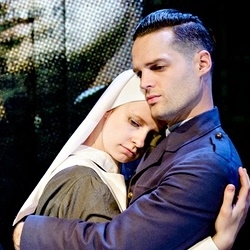A Farewell to Arms (Tour – Lancaster)
Michael Nunn feels the story is lost in the over use of video projections in ”A Farewell to Arms.”
A Farewell to Arms by Ernest Hemingway is a tragic love-story from 1929 set against the background of the Italian Campaign during World War I, and is based on the author’s own experiences there.

© Ed Waring
It has been adapted both for films and stage, but this new production at The Dukes in Lancaster marks its British stage première.
Adapted by multi-media company imitating the dog, co-written and co-directed by Andrew Quick and Pete Brooks, the production makes much use of video and live projection, sound score and other special effects more associated with the cinema rather than the stage.
So much so that the essential narrative of the powerful story is obscured and over-complicated by on-stage video cameras, distracting projected texts and other images, and the dialogue washed over by superfluous music and other sound effects.
The six actors, some doubling as chorus and cameramen, use microphones (unforgiveable) and the acting is erratic in quality. Putting a fair quantity of dialogue in French and Italian also doesn't help, especially when the projected translation texts fail.
I suspect that anyone who has not read the original would come away from this show with no real grasp of the poignancy and passion of this intense and powerful novel.
Having really enjoyed so much of the recent work both at The Dukes and by imitating the dog elsewhere, this self-indulgent production is both an infuriating disappointment and a real disservice to a classic tale of war and love.
A Farewell to Arms is at Cast, Doncaster until 1 November and tours to the following venues:
New Wolsey Theatre, Ipswich, 4 – 8 November
ITD Residency, Contact Theatre, Manchester, 10 – 12 November
Lowry, Salford Quays, 13 – 15 November
Birmingham Repertory Theatre, 19 – 22 November
The Old Market, Brighton, 27 – 29 November












